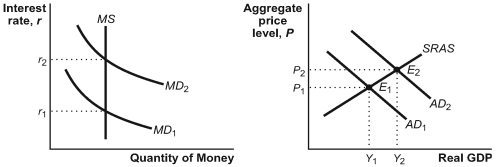Exam 17: Macroeconomics: Events and Ideas
Exam 1: First Principles198 Questions
Exam 2: Economic Models: Trade-Offs and Trade296 Questions
Exam 3: Supply and Demand264 Questions
Exam 4: Price Controls and Quotas: Meddling With Markets200 Questions
Exam 5: International Trade258 Questions
Exam 6: Macroeconomics: the Big Picture153 Questions
Exam 7: Gdp and the Cpi: Tracking the Macroeconomy321 Questions
Exam 8: Unemployment and Inflation332 Questions
Exam 9: Long-Run Economic Growth298 Questions
Exam 10: Savings, Investment Spending, and the Financial System385 Questions
Exam 11: Income and Expenditure130 Questions
Exam 12: Aggregate Demand and Aggregate Supply345 Questions
Exam 13: Fiscal Policy346 Questions
Exam 14: Money, Banking, and the Federal Reserve System428 Questions
Exam 15: Monetary Policy340 Questions
Exam 16: Inflation, Disinflation, and Deflation221 Questions
Exam 17: Macroeconomics: Events and Ideas309 Questions
Exam 18: International Macroeconomics441 Questions
Exam 19: Graphs in Economics60 Questions
Select questions type
Monetarists argued that fiscal policy was ineffective if the money supply increased.
(True/False)
4.9/5  (40)
(40)
Discretionary fiscal policy may be counterproductive because:
(Multiple Choice)
4.9/5  (39)
(39)
Use the following to answer questions:  -(Figure: Fiscal Policy with a Fixed Money Supply)Refer to Figure: Fiscal Policy with a Fixed Money Supply.Assume that this economy is at E1.Now government deficit spending increases and the Federal Reserve expands the money supply.According to this model:
-(Figure: Fiscal Policy with a Fixed Money Supply)Refer to Figure: Fiscal Policy with a Fixed Money Supply.Assume that this economy is at E1.Now government deficit spending increases and the Federal Reserve expands the money supply.According to this model:
(Multiple Choice)
4.8/5  (40)
(40)
The Ricardian equivalence argument says that households and businesses view any increase in government spending as a sign that tax burdens will increase in the future,which will cause a decrease in private spending in anticipation of higher future taxes.
(True/False)
4.9/5  (37)
(37)
Which argument was made in favour of using discretionary fiscal policy in fighting the Great Recession?
(Multiple Choice)
4.8/5  (38)
(38)
Despite of the budget deficits that resulted from the fiscal stimulus of 2009:
(Multiple Choice)
4.8/5  (34)
(34)
Which year is often described as the worst year of the Great Depression?
(Multiple Choice)
4.8/5  (34)
(34)
Use the following to answer questions:  -Friedman argued that with a _____ money supply,velocity is _____ that there's not much point in using monetary policy.
-Friedman argued that with a _____ money supply,velocity is _____ that there's not much point in using monetary policy.
(Multiple Choice)
5.0/5  (36)
(36)
What is the consensus among most economists today with respect to the management of unemployment?
(Multiple Choice)
4.9/5  (36)
(36)
Keynesian economics emphasizes _____ shifts in aggregate _____.
(Multiple Choice)
4.8/5  (41)
(41)
The period of relative calm in the economy between 1992 and 2007 is called the:
(Multiple Choice)
4.7/5  (34)
(34)
Which school of thought believes that expansionary monetary policy is effective in fighting recessions?
I.classical macroeconomics
II.Great Moderation consensus
(Multiple Choice)
5.0/5  (31)
(31)
Most economists today believe that effective monetary and fiscal policy can limit the fluctuations of the actual unemployment rate around the natural rate,but they are unable to keep unemployment permanently below the natural rate.
(True/False)
4.8/5  (37)
(37)
Classical macroeconomics was based largely on the foundation of:
(Multiple Choice)
4.9/5  (39)
(39)
Crowding out is MOST likely when expansionary fiscal policy is accompanied by:
(Multiple Choice)
4.8/5  (38)
(38)
New classical macroeconomists believe that the short-run aggregate:
(Multiple Choice)
5.0/5  (30)
(30)
Showing 241 - 260 of 309
Filters
- Essay(0)
- Multiple Choice(0)
- Short Answer(0)
- True False(0)
- Matching(0)